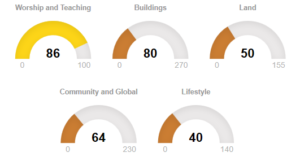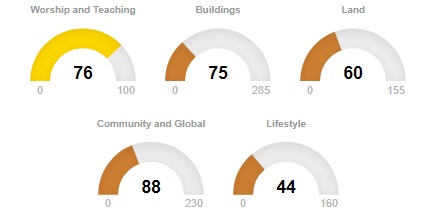
ECO Church is an award scheme for churches in England and Wales that want to demonstrate that they care for God’s Earth. The PCC of Capel and Ockley has committed your church, St John the Baptist, to the scheme, while St Margaret’s, Ockley have set out on their journey in Sept 2018. Find out more about the scheme on www.ecochurch.arocha.org.uk
Latest Status of our ECO Churches

07/06/2019: St Margaret, Ockley attain Bronze Award

18/03/2019: St John the baptist Capel Beyond Bronze Award
ECO News
Posted on March 24, 2021 by dineke

Both our churches have been registered ECO churches for a few years now. We hold a bronze award and are on a journey to achieve silver. A start has been made recently to survey the wildlife in St John’s churchyard and some local specialist volunteers will be helping us to make choices to encourage the wildlife in our already beautiful churchyard further. If you would like to see the survey questions and what your local church has replied, use this link to register ecochurch.arocha.org.uk/ and connect with St John. One way for a church to earn the required points towards an award is to encourage members of the congregation and the wider community to become aware of their own lifestyle and help them to improve. There are two great tools for you to look at and try out: * carbon footprint There are several but one we have used recently in the Lent course is footprint.wwf.org.uk/. Create your account and answer the questions to see how you contribute to the UK target to become carbon zero by 2045. * environmental audit Similar to the ECO church award scheme that we use as churches there is now a creation care scheme…
Read MoreRead More »
Posted on May 12, 2019 by dacott
Want to buy organic but find it’s too expensive? Consider buying organic for the fruits and veg below. When not grown organically,this ‘dirty dozen’ has some of the of the highest concentrations of chemicals. – Apples – Strawberries – Grapes – Celery – Peaches – Spinach – Sweet bell peppers – Nectarines – Cucumbers – Cherry tomatoes – Snap peas – Potatoes
Read More »
Posted on May 12, 2019 by dacott
5 tips for reducing your carbon footprint: 1. *Dial it down*. Moving your thermostat down in winter and up in summer could save about 2,000 pounds of carbon dioxide per year. 2. *Turn it off. *Make it a habit to turn off the lights when you’re leaving any room for 15 minutes or more. 3. *Use cold water*. Using cold water can save up to 80 percent of the energy required to wash clothes. 4. *Buy local.* It’s been estimated that if we try to buy food locally, the country could save over £2 billion pounds in congestion and environmental costs. 5. *Recycle.* We can leave out plastics, glass, paper and even textiles and small electrics to be collected for recycling. If you have questions about what you can recycle or how to do it, contact Mole Valley Council at 01306 885001.
Read More »
Posted on December 17, 2018 by dineke
Using water efficiently means that we can reduce the amount of water being taking out of our rivers and aquifers, especially as demands are rising. This helps protect our water resources and the wildlife that live there. Here are a few tips for saving water: * Turn off the tap while you’re brushing your teeth * Only wash full loads of laundry * Drink tap water instead of bottled (use a refillable bottle!) * Scrape rather than rinse dishes before loading into the dishwasher * Keep a pitcher of water in the fridge as opposed to letting the faucet run until it’s cold * If your toilet doesn’t have dual flush, consider putting a brick in the cistern to use less water (most toilets use more than they need to!) Sutton and East Surrey Water provide free water saving packs to consumers. Visit www.savewatersavemoney.co.uk<www.savewatersavemoney.co.uk>, or call 0345 371 0728 for information. More tips are available at www.waterwise.org.uk<www.waterwise.org.uk>.
Read More »
Posted on December 12, 2018 by dineke
Did you know that lots of wrapping paper we use can’t go into our recycling bins? This is particularly true of paper with foil or glitter decorations. Try recyclable or biodegradable wrapping paper this Christmas. Or why not try good old fashioned brown paper from any stationery shop or post office finished off with coloured ribbon.
Read More »
Posted on December 12, 2018 by dineke
The Autumn and Winter months are the most important months for hedgehogs to find sufficient food to put on enough weight before hibernation. So always make sure to put out food at this time of year. (Typically hedgehogs hibernate from late December/early January until late March). Hedgehogs are active during the night so the best time to put out food is just after dusk when they are starting to search for food. Meat-flavoured (ie: not fish) dog and cat food should be left out together with a handful of dog or cat biscuits and some mealworm. Hedgehogs are lactose intolerant so milk can make them very ill and should never be offered. Instead put out a dish of fresh water each night. Feeding hedgehogs should only be supplementary to their natural diet which is made up of a variety of bugs, grubs and slugs. It is therefore ideal to try and encourage more insect life in the garden by planting native plants and shrubs, creating a log pile, putting in a bug hotel and leaving an area of garden to be wild and overgrown. St Tiggywinkles are open 24/7 to provide advice and help. Tel: 01844 292292.
Read More »
Posted on November 22, 2018 by dineke
This Christmas, why not choose a charity gift from Christian Aid to give to your loved ones. It will bring a smile to their face and to someone further afield who needs a little bit of help from a friend. A few examples: £9 buys a child a school bag with books and pens, £13 pays for fishing training and £15 donates a pair of hens. These and many more useful gifts can be found here<charity-gifts.christianaid.org.uk/>. You will receive a voucher representing your chosen gift to add to someone’s stocking.
Read More »
Posted on October 1, 2018 by dineke
The best way of making our oceans plastic-free is by not letting the rubbish get there in the first place. One source of plastic is milk containers. Even though these are recyclable, evidence suggests that this only happens with a small proportion. They are not easy to avoid but one way is to order from your local milk man. Glass bottles are used on average 25 times and then recycled into new glass bottles. Perhaps a little more expensive but surely we’re worth it!
Read More »
Posted on September 4, 2018 by lrichardson
Most banks have no rules as to who they deal with and what projects they fund as long as it is legal. There are a few that have higher standards. Look up your bank in the list and see how they rank. Ethical banks put the charges where the costs are so you pay a small monthly fee but it puts the mind at rest to know that they don’t invest in weapons trading for example. This is just one of the things you can check on the following website: www.thegoodshoppingguide.com
Read More »



 Both our churches have been registered ECO churches for a few years now. We hold a bronze award and are on a journey to achieve silver. A start has been made recently to survey the wildlife in St John’s churchyard and some local specialist volunteers will be helping us to make choices to encourage the wildlife in our already beautiful churchyard further. If you would like to see the survey questions and what your local church has replied, use this link to register ecochurch.arocha.org.uk/ and connect with St John. One way for a church to earn the required points towards an award is to encourage members of the congregation and the wider community to become aware of their own lifestyle and help them to improve. There are two great tools for you to look at and try out: * carbon footprint There are several but one we have used recently in the Lent course is footprint.wwf.org.uk/. Create your account and answer the questions to see how you contribute to the UK target to become carbon zero by 2045. * environmental audit Similar to the ECO church award scheme that we use as churches there is now a creation care scheme… Read MoreRead More »
Both our churches have been registered ECO churches for a few years now. We hold a bronze award and are on a journey to achieve silver. A start has been made recently to survey the wildlife in St John’s churchyard and some local specialist volunteers will be helping us to make choices to encourage the wildlife in our already beautiful churchyard further. If you would like to see the survey questions and what your local church has replied, use this link to register ecochurch.arocha.org.uk/ and connect with St John. One way for a church to earn the required points towards an award is to encourage members of the congregation and the wider community to become aware of their own lifestyle and help them to improve. There are two great tools for you to look at and try out: * carbon footprint There are several but one we have used recently in the Lent course is footprint.wwf.org.uk/. Create your account and answer the questions to see how you contribute to the UK target to become carbon zero by 2045. * environmental audit Similar to the ECO church award scheme that we use as churches there is now a creation care scheme… Read MoreRead More »